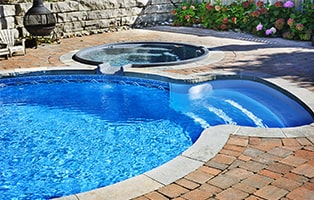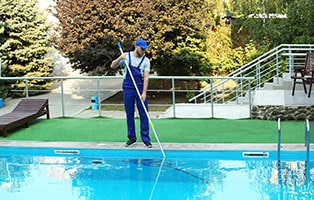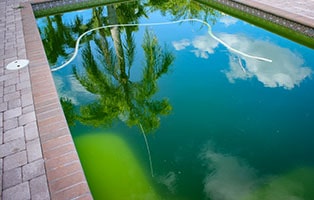If you want to know when to clean or replace your pool filter cartridges, read our informative article to get the entire scoop.
If you’re a proud pool owner, you’re going to need to do regular maintenance to keep it in tip-top shape.
One of the most critical pieces of pool maintenance you can do is periodically checking your pool filters for wear, tear, and accumulated dirt and debris. Often, all you have to do is to clean the cartridges.
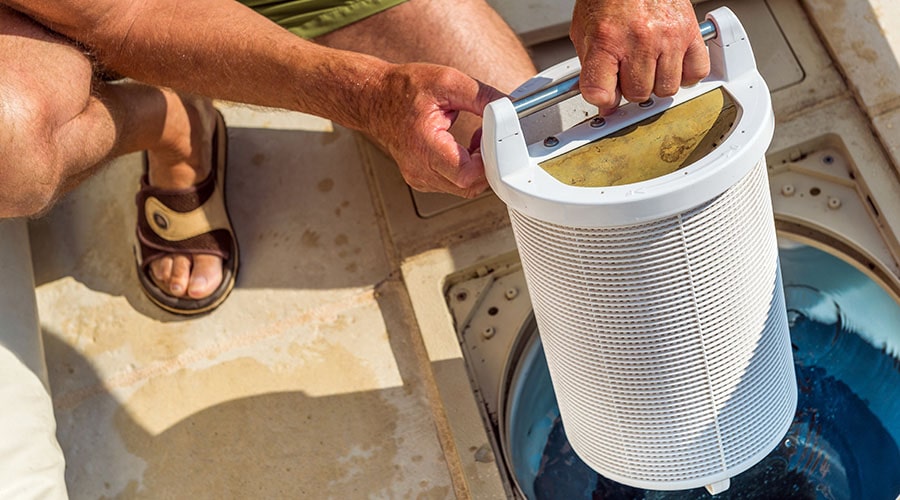
However, over time, dirt, oil, minerals, and other nasty gunk get absorbed deep in the filter fabric. Foreign material and embedded stains like this cannot be eradicated no matter how many times and how thoroughly you hose them out.
That’s when you need to replace your worn-out, disgustingly dirty cartridges for brand spanking new ones. Here’s exactly when to check your filters to see if you need to clean or replace them:
Increased Pressure Readings
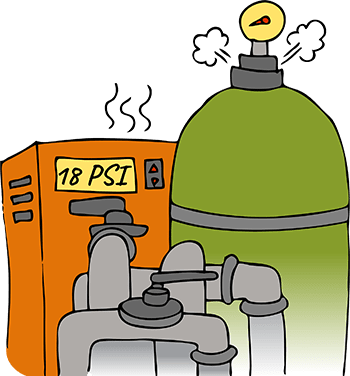
A steep spike in your pressure reading is a sign that your filter might be clogged.
When this happens, your poor filter will start working overtime in a valiant attempt to purify your pool of contaminants, causing the alarming pressure spike
This means that if your pressure gauge rises 8 PSI above normal operating pressure, you need to give it a good washing out. For example, if your baseline pressure is 10 PSI, you’ll need to check the filter’s condition when the PSI gets above 18 PSI.
Often, a quick hosing of the grime-encrusted filter can restore it to good working order. However, if spraying it down with a garden hose doesn’t work, give it an all-night chemical bath.
Check to see what type of cleansing solution your manufacturer recommends for your filter.
Maybe soaking it doesn’t do the trick and your filtration system still has an elevated pressure level. In that case, it’s high time to mosey on over to your friendly neighborhood pool supply store and get yourself a new cartridge.
Increased Frequency of Cleanings
An excellent way to calculate when to replace your filter is its half-life.
Now, you might have thought that only radioactive materials have half-lives, but you’d be wrong. When it comes to pool maintenance, “half-live” is when the length of time between cleanings is half what it used to be.
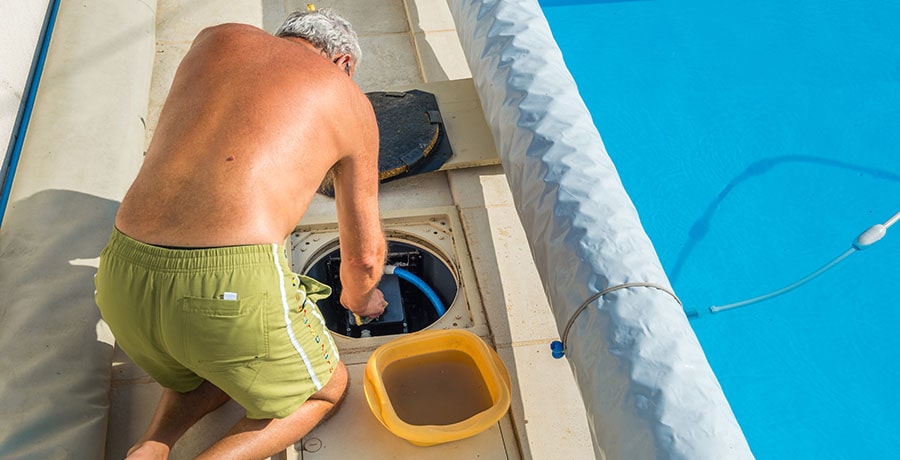
Having to clean your filter more means it’s nearing the end of its useful life. This means it’s time to retire your cartridge and get a new one.
Keep a log of the dates you cleaned your filter, so you have this information readily available.
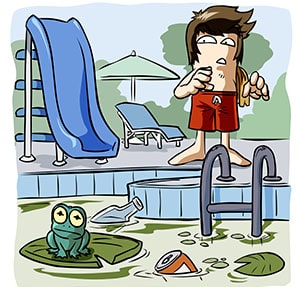
Lousy Water Quality
If your pool water remains icky looking even after all the chemicals in it have been properly balanced, you’ll probably want to switch out filters.
Another way to tell if your pool filter might be nearing its end is if you need to run your pump way longer than you used to maintain the crystal-clear purity of your pool. Try cleaning the cartridge first.
See if the problem clears up in a day or two. If it doesn’t, that means your filter isn’t able to filter the water as effectively as it did in its younger days and will need to be replaced.
Rips and Tears
Like every other physical object in the universe, your pool filter is subject to the laws of entropy.
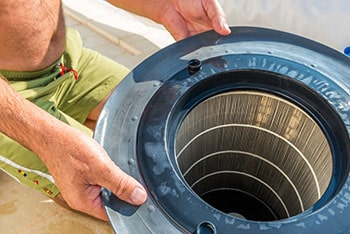
This means that it’s going to wear out over time and require replacement. One way this entropic madness rears its ugly head is when the fibers that compose its body start to slowly unravel. When this happens, despicable dirt, slimy algae, and other repulsive crud will sneak through the gates and into your pool.
That’s why every time you clean your filter, you should closely inspect it for rips and tears.
If there’s a lot of what I like to call “surface furriness,” this means that fibers are coming apart, and there will be a steep drop in the filter’s ability to do its job. You’re better off purchasing a new one because no amount of cleaning will restore workability to the cartridge.
Make sure you also look between the pleats for signs of fraying.
Band Breakage
If you see a fair amount of breakage on the bands, look closely at the cartridge to ensure it’s still in good condition.
Those bands are designed to make sure there’s proper spacing between the filter’s pleats. If the bands do break, your filtering ability will be diminished.
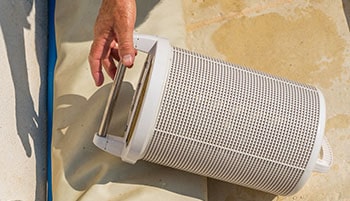
Discoloration
If your filter cartridge has signs of discoloration, it might be time to clean or replace it.
While it will never be as white as when you first bought it, it shouldn’t have permanent dark brown or oily stains. If it does, it means it’s saturated with oils.
You need to soak it in a cartridge cleaner to help pull those oils out. If the oils don’t come out with the help of a good cartridge cleaning solution, you might need to replace your filter
Broken End Caps
The plastic ends on your cartridges act as bookends sandwiching the filter material and keeping it tight.
End caps are manufactured from heavy-duty plastic, but harsh chemicals can make them brittle. If your filter cartridge end caps are broken, you’ll need to replace them.
Small stress cracks might not be a problem, but any breaks in the cap mean you need to replace the filter immediately.
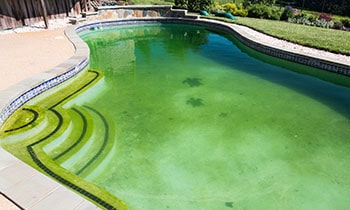
Other Times You Should Check Your Pool Filter
Here are some other times you should clean your pool filter:
- During an algae bloom treatment
- After major storms
- As part of the process of opening or closing your pool
How to Clean a Filter Cartridge
The more thoroughly you clean your pool filter cartridge, the longer it will last.
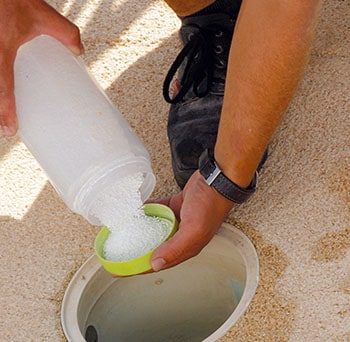
I don’t recommend hastily spraying it off and putting it back—give it a thorough going over each time. To clean a filter cartridge, remove any large dirt and debris particles. You can use a garden hose to get rid of the larger debris, cleaning between the pleats from top to bottom.
A pool filter cartridge cleaning wand will clean out even the deepest folds. It uses a powerful scrub brush with a highly pressurized water stream to scour away crud from your filters.
Merely attach the wand to your garden hose, and you’re good to go.
Next, soak the filter in a commercial cleaning solution to eliminate accrued oil and assorted other filth. For best results, allow your cartridge to completely dry before placing it back in the filter tank.
You might want to have backup filter cartridges. That way, you can switch cartridges when it’s time to clean them, and you won’t be without filters during the cleaning and drying process.
Think About Getting a Bigger Filter
Bigger cartridge filters have longer cleaning cycles and fewer cleanings per year, in many cases requiring only a single cleaning at closing time.
Larger filters also last longer than smaller ones.
Conclusion
Say you want your pool to be the envy of the neighborhood and not a foul-smelling swamp where only gunk-encrusted monstrosities dare to wade. In that case, you’re going to need to be exceedingly vigilant about doing routine maintenance.
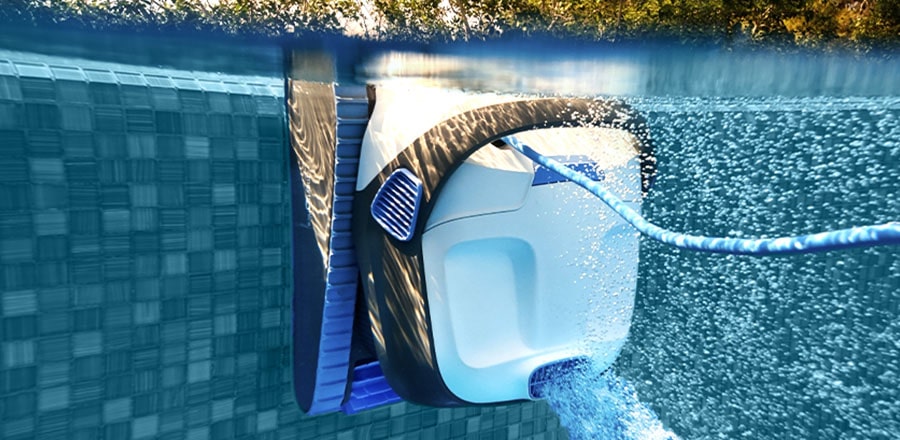
One of the most critical pool maintenance duties is periodically checking your filters to see if they need to be cleaned or replaced. This will help your pool water to remain stunningly translucent, extend the life of your pump and filtration system, and reduce your energy costs.
If you want to make pool cleaning a breeze, consider buying one of these automatic pool cleaners.
By purchasing one, you’ll be able to kick back and relax this summer instead of toiling for hours each week making sure your pool looks sparkling clean.

Pool Maintenance Tips & Tricks
